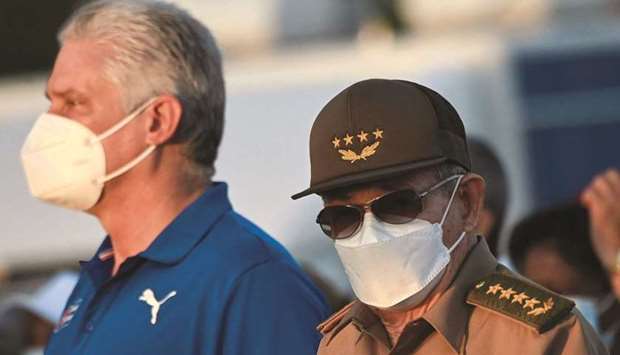Raul Castro was among thousands who attended a government-organised rally in Havana on Saturday to denounce the US trade embargo and reaffirm their support for Cuba’s revolution, a week after unprecedented protests rocked the communist-run country.
Government supporters gathered on the city’s seafront boulevard before dawn to wave Cuban flags and photos of late revolutionary leader Fidel Castro and his brother Raul.
The latter retired as Communist Party leader in April but promised to continue fighting for the revolution as a “foot soldier”.
The rally was a reaction to demonstrations that erupted nationwide on July 11 amid widespread shortages of basic goods, demands for political rights and the island nation’s worst coronavirus (Covid-19) outbreak since the start of the pandemic.
The government admitted some shortcomings this week but mostly blamed the protests on US-financed “counter-revolutionaries” exploiting economic hardship caused by US sanctions.
President Miguel Diaz-Canel, who also heads the Communist Party, told the crowd that Cuba’s “enemy has once again thrown itself into destroying citizen’s sacred unity and tranquillity”.
He also denounced what he said was a false narrative over unrest on the Caribbean island.
“What the world is seeing of Cuba is a lie,” Diaz-Canel said during the rally on the Malecon, Havana’s famed oceanfront boulevard.
He said that it was no small matter to call a rally as the country saw increasing numbers of Covid-19 cases: “We convened you to denounce once more the blockade, the aggression and terror.”
Cries from the crowd – “Down with the Yankees!” and “We were born to conquer, not be conquered!” – echoed the anti-imperialist language of the original Cuban revolutionary, former president Fidel Castro.
Diaz-Canel decried what he said was the dissemination of “false images” on social networks that “glorify the outrage and destruction of property”.
Those images, he said, had caused “immeasurable damage to the national soul”.
Authorities said similar rallies were held nationwide.
The official newspaper Granma said similar rallies were called in cities including Santiago de Cuba, Bayamo, Camaguey and Santa Clara.
“This revolution will continue for a long time,” said Margaritza Arteaga, a state social worker who attended the rally in Havana.
Workers had been convened by neighbourhood block committees, known as the Committees for the Defence of the Revolution, she said, and a state bus had picked her up at 4am.
Shortly before the rally in Havana officially began, authorities removed a man shouting anti-government slogans, including “freedom”, from the crowd.
The number of those detained during or after protests has grown as new reports trickle in amid irregular outages in Internet and messaging applications on the island.
The latest tally from exiled rights group Cubalex put those detained at 450, although some have since been released.
Activists have accused authorities of repression as some videos have emerged on social media of police beating protesters.
The government has not yet given official figures for those detained although it has said it has arrested those it suspects of instigating unpatriotic unrest or of carrying out vandalism.
State television has broadcast images of people looting Cuba’s controversial dollar stores and overturning empty police cars.
The presence of the 90-year-old Castro, drawn out of retirement because of the gravity of the situation, at the rally is noteworthy.
He wore his olive-green general’s uniform, harkening back to his revolutionary role alongside brother Fidel.
“Everyone who feels something for the revolution, who felt something for Fidel, for all he did for this country and that we must continue to do, knows what Raul’s presence here means,” said one rally participant, 65-year-old Carlos Cruz.
The rallies – both for and against the government – were the largest since the revolution and came as the country endures its worst economic crisis in 30 years, with chronic shortages of electricity, food and medicine amid a spike in coronavirus infections.
The island of 11.2mn people recorded 6,062 new cases of Covid-19, and 52 deaths, in the preceding 24 hours, the authorities said.
The toll stands at 275,608 cases and 1,843 deaths.
“With or without the pandemic, we have to defend (the revolution),” said 73-year-old teacher Hector Roman, who wore a protective mask.

Cuban President Diaz-Canel (left) and former president Raul Castro at the rally in Havana.
